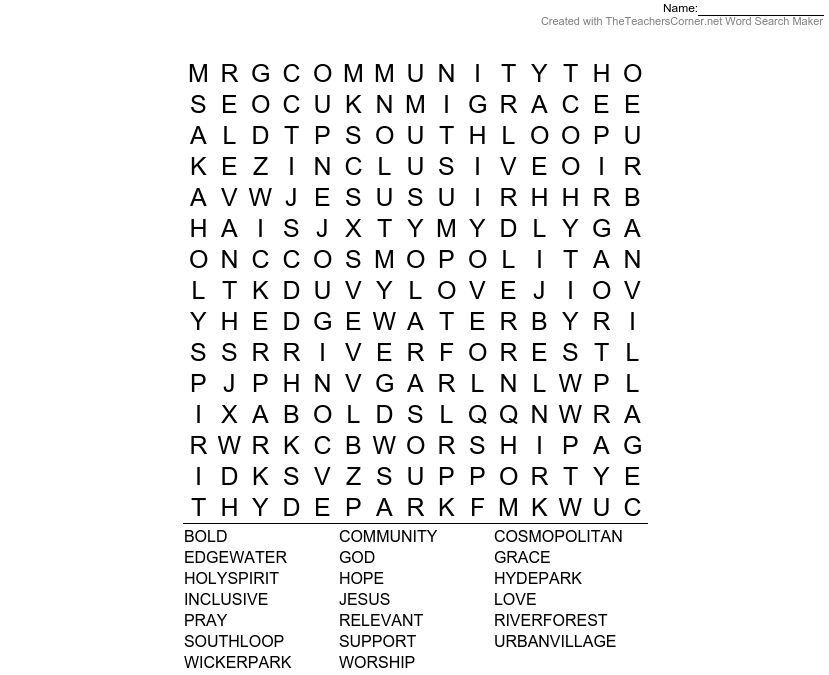For there is hope for a tree, for if it is cut down, that it will sprout again… (Job 14:7, NRSV)
(God) breaks me down on every side, and I am gone, (God) has uprooted my my hope like a tree. (Job 19:10, NRSV)
We always start our staff meetings with a brief devotional and, in honor of our current sermon series on play, our South Loop/Edgewater site pastor Chan Choi led us in a game last Tuesday where we played a hidden word puzzle. In this version, though, all the words were connected to Urban Village in some way. As a group, we looked for answers like WICKERPARK and INCLUSIVE and got through them pretty quickly. There were 20 to be found and in a matter of a couple minutes, we found 19 of them, but we had a hard time finding the last one: HOPE. All of the other words were horizontal or vertical, but HOPE eluded us until finally our interim Wicker Park site pastor Kelli found it in the upper right corner. It was both diagonal and backward so no wonder HOPE was hard to find. It didn’t take long for us to name that that’s true in more ways than one.
A few people have asked me if I would ever write another book and lately the Spirit seems to be perhaps nudging me to think about it. As I ponder possible topics, hope keeps popping up. I’m not sure how far I’ll go with this, but I’ve started on this potential project by looking up all the mentions of “hope” in the Bible (there are 202 in the New Revised Standard Version) and doing a little research on each mention.
One thing surprised me right away. “Hope” shows up the most in the book of Psalms (29 times), which isn’t surprising since Psalms is one of the longest books in the Bible and is filled with poetry and hymns. What surprised me was the book that came in second : Job. Hope shows up in Job 15 times. For those who don’t remember the story of Job, here is a man who has everything and then loses everything: His livestock are killed by invaders, his children are killed by a windstorm, and then he’s afflicted by a skin disease that covers his entire body. This happens in the first two chapters and then the remaining 40 chapters are dedicated to reflections on the nature of God and attempted answers to the age-old question: Where is God in the midst of tragedy? This is the book where hope shows up more than a few times.
The two verses I cite above are a good indication of how Job uses hope…and I think how we see hope, too. In chapter 14, Job is convinced that hope is like a tree. It is regenerative and ready to burst forth anew. In chapter 19, he uses that same metaphor of the tree to cry that his hope has been uprooted and new life is not possible.
Sound familiar? Some days, I’m full of hope and convinced that even in the midst of this train wreck of a year, God is doing new things. Other days, I feel defeated and consider hope to be a long-lost artifact, never to be used again. The book of Job reminds us that we’re not alone. Humanity has always struggled with this. Hope can be hard to find.
But on those days when we consider hope a luxury, I look for a small branch that tells me hope is still possible. Or, maybe I just look for that first letter. An “h.” If I can find an “h”, maybe the o-p-e will follow.

